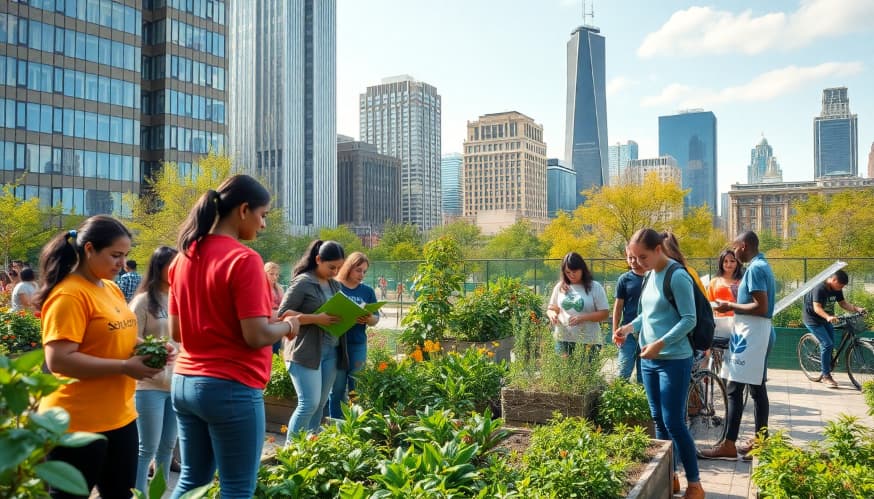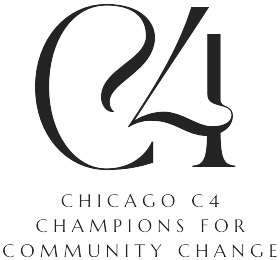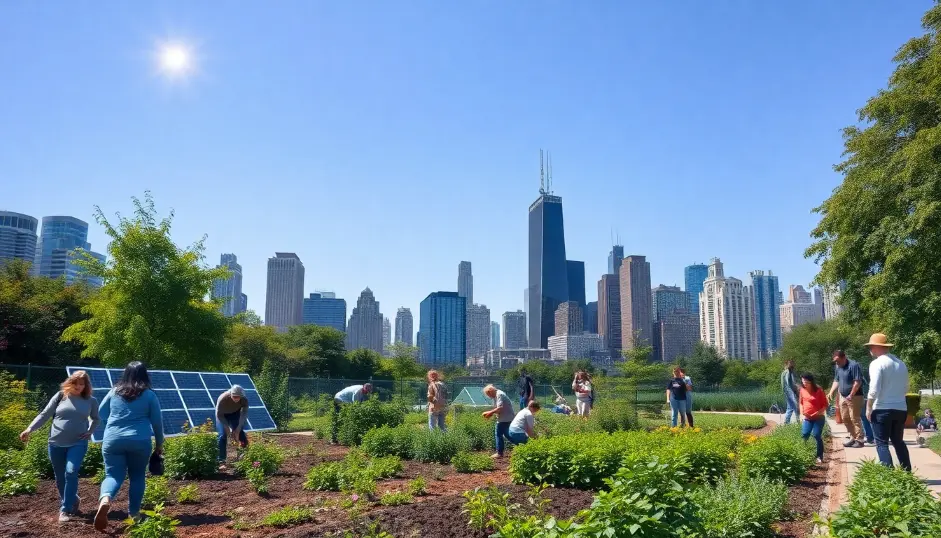Chicago is where environmental nonprofits truly shine. The city’s environmental challenges—climate change, air pollution, urban heat islands and unequal access to green spaces—are exactly what these organizations are fighting to overcome. At the heart of that effort are community engagement, policy advocacy and direct action. That comprehensive approach is what will build a greener Chicago for all residents.
Chicago’s Environmental Powerhouses
Alliance for the Great Lakes
That five-star rating from community reviewers speaks for itself. The Alliance for the Great Lakes is one of Chicago’s top environmental organizations. Its mission is to protect and conserve the Great Lakes ecosystem. That means working on water quality initiatives, shoreline conservation and public education about this vital freshwater resource. Effective conservation strategies for the Great Lakes region are crucial for Chicago’s environmental health and drinking water supply.
Faith in Place
Faith in Place brings faith communities together to address environmental challenges. And it does so in a way that bridges environmental stewardship with spiritual values. That inclusive, practical approach helps mobilize diverse communities that might not otherwise participate in environmental initiatives. And that’s exactly what Chicago needs.
Openlands
Founded in 1963, Openlands has been at the forefront of urban conservation in Northeastern Illinois. As an accredited land trust, the organization focuses on protecting important landscapes and delivering technical expertise in ecology and restoration.
Their notable achievements include:
- Establishing the Illinois Prairie Path in 1964 (the nation’s first rails-to-trails project)
- Advocating for the creation of Indiana Dunes National Lakeshore
- Launching the TreeKeepers program that trains volunteers in tree planting and care
- Creating the Space to Grow initiative that transforms schoolyards with green infrastructure
Little Village Environmental Justice Organization (LVEJO)
LVEJO has emerged as a significant advocate for environmental justice in Chicago’s Little Village neighborhood, focusing on creating healthier communities through grassroots activism. Founded in 1994 when local parents organized against toxic conditions at a school, LVEJO has achieved remarkable successes including:
- The closure of two coal power plants
- Transforming a Superfund site into a 21-acre park (La Villita Park)
- Implementing food justice initiatives including hot meal drop-offs, backyard garden startups, and a community farm
In 2022, they harvested and distributed nearly 16,000 pounds of produce and about 1,000 fresh eggs, showcasing their impact on local food systems.
Delta Institute
The Delta Institute collaborates with communities throughout the Midwest to solve complex environmental challenges. Their work benefits over five million Midwesterners through three main program areas:
- Nature-Based Climate Solutions
- Resilient Agriculture
- Sustainability & Support Services
By 2025, they aim to transition one million acres to conservation-focused practices, improve water quality, and reduce flooding by capturing 100 million gallons of stormwater. Their strategic goals include investing $100 million in municipal green infrastructure and creating resources for community partners.
Environmental Justice Initiatives
Chicago Environmental Justice Network (CEJN)
The Chicago Environmental Justice Network unites neighborhood-based, grassroots environmental justice organizations working throughout Chicago’s metropolitan area in frontline communities. This coalition brings together BIPOC-led organizations to address environmental injustices and increase community participation in decision-making processes that affect their environments.
CEJN has been instrumental in campaigns such as the successful effort to deny a permit for a facility that would have exacerbated pollution in the Southeast Side of Chicago, involving community members in hunger strikes and advocacy efforts to raise awareness.
Environmental Justice Challenges in Chicago
Chicago’s environmental justice issues are deeply rooted in systemic inequities, with communities of color and low-income neighborhoods disproportionately bearing the burden of pollution and environmental degradation. The Southeast Side faces a staggering 30-year life expectancy gap compared to other areas, highlighting severe health disparities.
Historical practices like redlining and discriminatory zoning have concentrated industrial pollution in specific neighborhoods, creating what some describe as “sacrifice zones” where pollution is an expectation rather than an exception.
Community-Led Solutions
Environmental justice organizations in Chicago emphasize community-led approaches to addressing environmental challenges. Organizations like Blacks in Green, founded by Naomi Davis in 2007, aim to develop “sustainable square miles” in predominantly Black communities, focusing on:
- Creating solar and geothermal electric grids
- Developing community farms
- Building affordable housing
- Establishing climate resilience hubs
These initiatives combat environmental racism while empowering residents to create their own solutions. The organization has received funding through the Biden administration’s Justice40 initiative, which aims to ensure that disadvantaged communities receive at least 40% of the benefits from federal climate investments.
Conservation and Green Space Initiatives
Chicago Region Trees Initiative (CRTI)
The Chicago Region Trees Initiative, led by The Morton Arboretum, works to improve people’s lives by supporting the health, diversity, and equitable distribution of trees throughout Chicago and Illinois. The initiative aims to develop a healthier, more diverse urban forest by 2050, addressing challenges such as invasive plants, pests, and development pressures.
CRTI provides:
- Resources for tree planting and care
- Tools to identify priority areas for investment
- Collaboration with over 200 organizations
- An Interactive Canopy Map showing tree statistics for every neighborhood
- A Priority Map helping land managers identify areas most in need of tree cover improvements
Urban Forestry Programs
Urban trees provide numerous benefits to Chicago, including filtering air and water, conserving energy, providing wildlife habitat, and reducing energy costs. However, significant disparities exist in tree coverage between low- and high-income neighborhoods and between communities of color and white communities.
The Treesilience initiative, a collaboration involving The Nature Conservancy, USDA Forest Service, and community organizations, aims to reduce these disparities by planting, maintaining, and replacing trees in high-need urban neighborhoods. Programs like the Imani Green Health Advocates train community members in urban forestry and community health, creating career opportunities while improving neighborhood well-being.
Chicago Park District Sustainability Efforts
The Chicago Park District has implemented various sustainability initiatives aimed at making Chicago a greener city, as outlined in their 2025-2030 Strategic Plan. The district manages thousands of acres of parkland and hundreds of facilities with environmentally conscious operations, focusing on principles such as:
- Improving energy efficiency
- Conserving water
- Reducing waste
- Supporting sustainable business practices
Their efforts include improving ecological conditions, redeveloping brownfields, connecting people with nature, and protecting the tree canopy. The Park District also provides educational programs and partnerships with other organizations to advance environmental sustainability and community resilience.
Community Engagement and Education
Chicago Conservation Corps (C3)
The Chicago Conservation Corps collaborates with partners across the city to inspire and fund lasting change through grassroots community organization and climate action. C3 acts as a force multiplier by training everyday Chicagoans to launch their own sustainability projects in their communities.
Since 2006, C3 has trained and supported 900 sustainability leaders who have completed over 835 projects, impacting more than 175,000 community members. These projects cover various areas including:
- Water conservation
- Energy efficiency
- Green space development
- Waste reduction
- Community organizing
C3 provides education, empowerment, and funding for unlimited sustainability projects, emphasizing the importance of community-driven environmental initiatives.
Environmental Education Initiatives

Environmental education is where Chicago’s sustainable future takes shape. Organizations like the Student Conservation Association’s Urban Green program give teens and young adults hands-on experience in environmental conservation. That kind of grassroots engagement is exactly what we need to build a healthier, more sustainable city.
Many companies—HVAC companies included—have a unique chance to help customers save money and the environment by installing energy-efficient systems. These systems lower energy costs, improve comfort and reduce environmental impact. Companies like Optimized Air are leading the way in environmentally friendly HVAC solutions. They prioritize sustainability without sacrificing indoor comfort.
At the heart of any sustainable HVAC business is investing in energy-efficient equipment. By using more efficient equipment, businesses like Optimized Air can cut their carbon footprint and help customers achieve real energy savings. Their expert technicians can recommend customized solutions that balance budget considerations with environmental goals.
The spotlight on sustainable energy solutions has really shone a light on the HVAC industry’s contribution to energy consumption. As businesses and households seek energy-efficient solutions, that pursuit has gained traction. Companies like Optimized Air are at the forefront of this movement. They offer cutting-edge systems designed with sustainability in mind.
One of the key technologies driving that movement is Energy Recovery Ventilation (ERV) systems. ERV systems enhance indoor air quality while minimizing energy consumption. They recover and exchange energy between the air streams coming in and going out, optimizing efficiency and reducing environmental impact.
Optimized Air specializes in those advanced systems. They provide customers with healthier indoor environments while reducing energy usage.
The optimization of an HVAC system’s operation—eliminating energy waste in the process—will be the most sustainable and cost-efficient driver to reduce energy consumption in both residential and commercial settings. Optimized Air’s professional audits can identify inefficiencies in existing systems and recommend upgrades or maintenance procedures to maximize performance.
Smart HVAC systems with built-in smart technologies and advanced controls can optimize energy usage based on real-time conditions. They adapt to user preferences, weather forecasts and occupancy patterns, ensuring energy efficiency without compromising comfort.
Optimized Air’s smart HVAC solutions give customers precise control over their indoor environment. They automatically adjust to minimize waste. By reducing energy consumption, energy-efficient HVAC systems decrease greenhouse gas emissions. Customers can reduce their carbon footprint while enjoying the benefits of modern HVAC technology.
That’s where Optimized Air comes in—as not just a service provider, but an environmental steward. They actively educate clients about the environmental benefits of their solutions.
The Student Conservation Association’s Urban Green program is a great example of how environmental education can drive real-world change. Participants earn money while gaining experience through roles like Field Leaders and Crew Members. They work on tree planting, habitat restoration and community engagement. The program emphasizes career development and leadership skills. Participants get to work alongside established organizations like the Chicago Region Trees Initiative and Openlands.
University-Led Sustainability Programs
Universities in Chicago are making significant contributions to environmental sustainability through various programs and initiatives. Loyola University Chicago, for example, is committed to making its campus carbon neutral for directly controlled emissions by 2025, as outlined in its Climate Action Plan.
The university’s School of Environmental Sustainability provides hands-on internship opportunities for students, allowing them to engage deeply in environmental initiatives. Loyola also emphasizes sustainability in its campus operations, including the Campus Compost Initiative, which has diverted over 62 tons of food scraps from landfills since 2012.
Funding and Sustainability
Funding Opportunities for Environmental Initiatives
A variety of public and private funding opportunities are available for organizations to accomplish environmental and forestry goals in Chicago. These include:
Federal programs:
- White House Inflation Reduction Act
- National Coastal Resilience Fund
State-level funding:
- Illinois Environmental Protection Agency Revolving Fund
Municipal funding initiatives:
- Cook County’s Electric Vehicle Charging Stations Program
- Garden for Nature Grant Program
The Chicago Wilderness Alliance provides a comprehensive list of these funding opportunities, which are essential for nonprofits and community organizations to implement effective environmental strategies and enhance climate resilience in the region.
Corporate Partnerships for Sustainability
Corporate partnerships play a significant role in advancing environmental initiatives in Chicago. The Chicago Region Trees Initiative’s corporate sustainability program has helped 22 local corporations launch sustainability partnerships since 2020. These partnerships fund projects such as:
- Community tree plantings
- Park rehabilitation
- Woodland ecosystem restoration
- Larger, region-wide initiatives
Organizations like the Green Building Initiative (GBI) provide certification and assessment programs for sustainable buildings, helping businesses gain a competitive advantage while supporting environmental goals. The World Business Council for Sustainable Development (WBCSD), which opened an office in Chicago, aims to accelerate progress towards a sustainable future by connecting businesses, government agencies, civil society organizations, and academic institutions.
Sustainability in Policy and Planning
Chicago’s sustainability efforts are supported by various policies and planning initiatives. The city’s Sustainable Development Policy (SDP), created in 2004 and revised in 2017 and 2024, uses a point-based system to ensure new development meets sustainability standards.
Mayor Brandon Johnson has advanced strategies to combat climate change, pollution, and waste while centering the needs of Chicago’s working families. His administration has:
- Re-established the Department of Environment (DOE)
- Launched the city’s first citywide composting initiative
- Created a Native and Pollinator Garden Registry
- Allocated funding for residential building decarbonization through the Green Homes Chicago program
The city has also introduced the Clean and Affordable Buildings Ordinance (CABO) to limit indoor fossil fuel emissions and is leveraging federal clean energy funding to benefit all Chicago residents under the Inflation Reduction Act.
Future Trends and Challenges
Climate Resilience and Adaptation
Chicago faces significant challenges in building climate resilience and adapting to changing environmental conditions. The city is already experiencing temperature increases, more heavy rain events, and local flooding that can all place further stress on urban infrastructure and ecosystems.
The Chicago Region Trees Initiative is working to improve management skills and knowledge, increase the region’s tree canopy, and incorporate species that are resistant to pests and the impacts of climate change. The city’s 2022 Climate Action Plan includes five pillars focused on waste reduction strategies and expanded composting and recycling programs.
However, concerns have been raised about Chicago’s recycling system needing significant improvement, with large landfills being major contributors to climate change.
Environmental Justice and Equitable Development
Environmental justice remains a significant challenge for Chicago, with the risk of “green gentrification” as environmental improvements can lead to increased housing costs that displace long-time residents. Chicago is joining a nationwide trend of incorporating equity and justice goals into climate change preparations, particularly to protect marginalized communities.
The city’s Cumulative Impact Assessment, completed in 2023, identifies neighborhoods with the greatest environmental burdens, supporting the city’s compliance agreement with the U.S. Department of Housing and Urban Development. Chicago is also focusing on:
- Developing affordable housing in high-amenity areas
- Revitalizing historically marginalized communities
- Implementing home repair programs
- Supporting decarbonization initiatives for low and moderate-income families
Collaborative Future for Environmental Nonprofits
The future of environmental nonprofits in Chicago depends on effective collaboration and partnership development. The Mission Sustainability Initiative (MSI) at Forefront provides resources and support to help nonprofits explore sustained collaboration and strategic partnership. These collaborations enable organizations to share expertise, resources, and networks, creating more impactful environmental initiatives.
Looking ahead, environmental nonprofits will need to adapt to changing funding landscapes, political contexts, and community needs. The Sustainability Research and Innovation Congress, scheduled for June 16-19, 2025, in Chicago, aims to unite global leaders from research, government, business, philanthropy, art, communications, technology, and civil society to advance sustainability efforts, focusing on themes such as One Health, Collaborative Decision-Making, Holistic Solutions, and Innovative Tools.
Conclusion
Chicago’s environmental nonprofits are driving significant progress toward a more sustainable and equitable city through their diverse initiatives spanning conservation, environmental justice, education, and community engagement. These organizations are not only addressing immediate environmental challenges like pollution and climate change but are also working to transform systems that have historically perpetuated environmental inequities.
By fostering collaborations between communities, government agencies, businesses, and academic institutions, they are creating a comprehensive approach to sustainability that considers both ecological health and social justice. As Chicago continues to face environmental challenges, these nonprofits will remain essential partners in building resilience, promoting innovation, and ensuring that all residents benefit from a greener, healthier future.


No responses yet